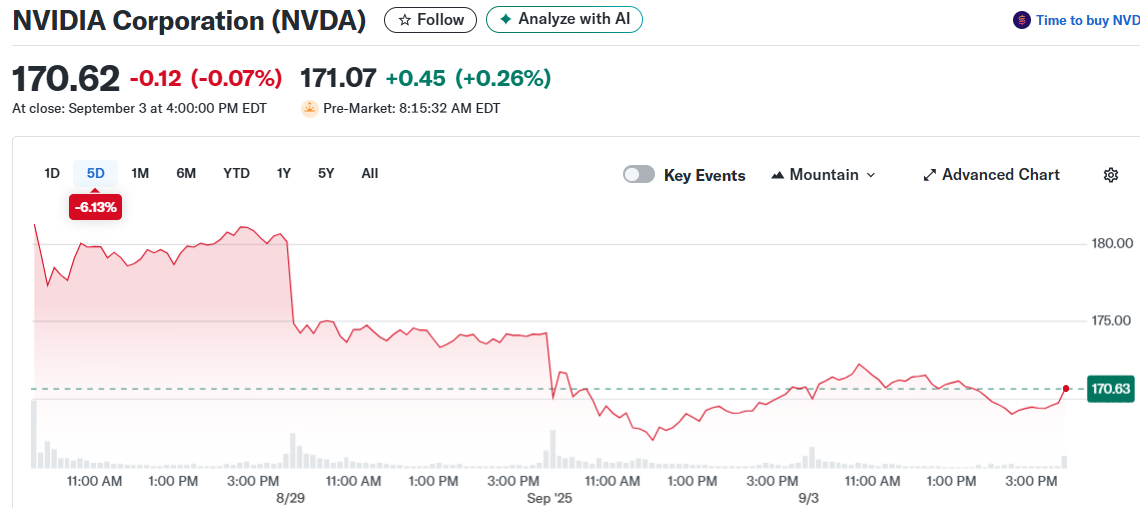TLDR
- Jim Cramer warned investors to focus on NVIDIA GPU profitability over China sales concerns before earnings
- NVIDIA beat Q2 estimates with $1.05 EPS and $46.74B revenue but stock fell on China uncertainty
- Company must pay 15% of China H20 chip revenue to U.S. government under licensing deal
- Alibaba developed competing AI chip though less capable than NVIDIA’s advanced processors
- Stock testing 50-day moving average support after three consecutive days of declines
NVIDIA stock tested key technical support levels Wednesday as Mad Money host Jim Cramer’s pre-earnings analysis proves increasingly relevant. The AI chipmaker has dropped for three straight sessions since reporting quarterly results.

Cramer advised investors before earnings to ignore China sales debate. He emphasized focusing on GPU profitability for NVIDIA customers instead.
“He wanted 20, Jensen got it down to 15,” Cramer said, referring to profit margin negotiations. The CNBC host called China sales discussions “noise” distracting from core business fundamentals.
NVIDIA delivered second-quarter earnings of $1.05 per share, beating analyst estimates of $1.01. Revenue reached $46.74 billion, surpassing the $46.05 billion consensus.
The company’s third-quarter revenue forecast of $54 billion barely exceeded Wall Street’s $53.43 billion expectation. NVIDIA reported zero H20 chip sales from China during the quarter.
Unprecedented China Revenue Agreement
NVIDIA secured licensing to sell H20 AI chips in China through a controversial revenue-sharing deal. The company must pay 15% of China chip sales to the U.S. government.
Legal experts questioned the arrangement’s precedent and validity. International trade attorney Doug Jacobson described the situation as entering “uncharted universe” territory.
The deal structure may conflict with Bureau of Industry and Security regulations. Former BIS adviser Aiysha Hussain suggested the revenue-based fees could violate existing statutes.
Advanced Micro Devices also negotiated a similar revenue agreement with the Trump administration. Both chipmakers are managing complex trade relationships during ongoing U.S.-China tensions.
NVIDIA excluded H20 sales projections from its current-quarter revenue guidance. The company had previously ordered 300,000 additional H20 chips from Taiwan Semiconductor.
Alibaba Competition and Technical Outlook
Chinese e-commerce giant Alibaba developed a new AI chip for internal operations. The processor offers more versatility than previous Alibaba versions but remains less powerful than NVIDIA’s advanced chips.
This represents growing Chinese efforts to develop domestic semiconductor capabilities. The development occurs as NVIDIA faces continued regulatory scrutiny in China.
NVIDIA shares fell below their 50-day moving average Tuesday and tested that level Wednesday. Technical analysts recommend waiting for proper base formation before considering new positions.
The company announced a $60 billion share buyback program with earnings. NVIDIA became the first company reaching $4 trillion market capitalization in July.
Analyst reactions remained generally positive despite China concerns. William Blair’s Sebastien Naji maintained an outperform rating with $205 price target. Susquehanna’s Christopher Rolland raised his target to $210 from $180.
President Trump previously threatened 100% semiconductor tariffs but exempted companies manufacturing domestically. Taiwan Semiconductor’s Arizona facility expansion has positioned it favorably under current trade policies.
NVIDIA sold approximately 1 million H20 chips in 2024 according to research firm SemiAnalysis data.





